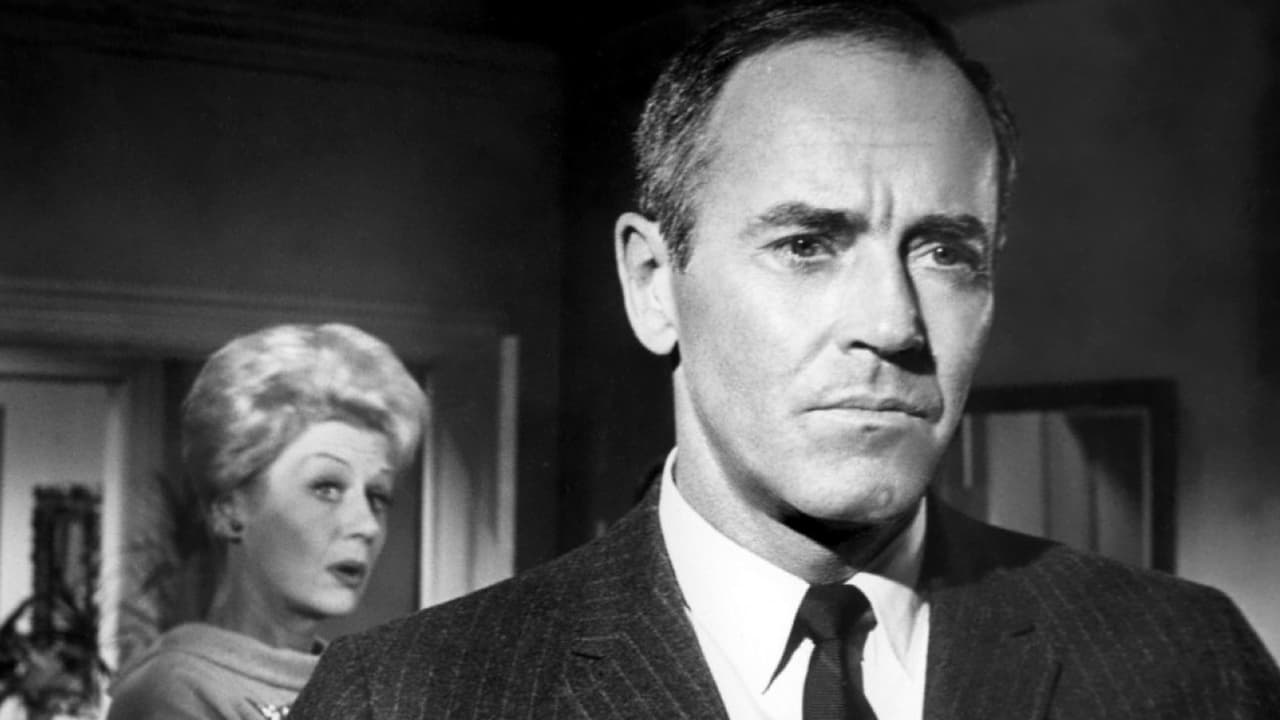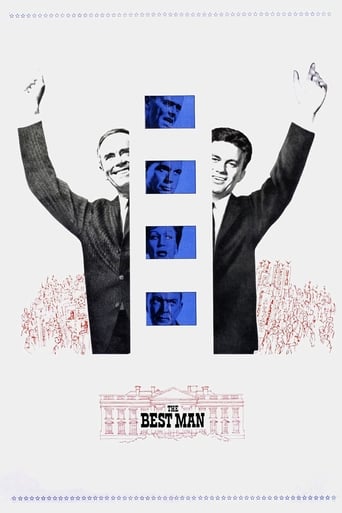Jemima
It's a movie as timely as it is provocative and amazingly, for much of its running time, it is weirdly funny.
Kinley
This movie feels like it was made purely to piss off people who want good shows
Catherina
If you're interested in the topic at hand, you should just watch it and judge yourself because the reviews have gone very biased by people that didn't even watch it and just hate (or love) the creator. I liked it, it was well written, narrated, and directed and it was about a topic that interests me.
Kimball
Exactly the movie you think it is, but not the movie you want it to be.
dougdoepke
The movie's a cynical look behind-the-scenes at American presidential politics. Conflicted idealist candidate Russell (Fonda) needs just a few more delegate votes to go over the top. But can he play the kind of political hardball necessary to get them. At the same time, ruthless candidate Cantwell (Robertson) won't hesitate to throw dirt from the past to discredit him. Trouble is that Russell will have to lower himself to Cantwell's level to stave off the attack, something that would injure his strong sense of character.Writer Vidal does a good job of dramatizing the conflict between ideals and practical politics. We all respect strong ideals, so Russell comes off as the good guy, conflicted, but basically what we think presidents are supposed to be. What I like is Vidal's questioning of whether ideals are enough qualification for the highest office. That comes about through Cantwell's questioning of whether his opponent is decisive enough to be a commander-in-chief. Of course, Cantwell is nothing if not decisive; he knows what he wants. On the other hand, Russell wavers when confronted with a difficult choice. After all, he's got many more norms than his rival to consider. However, Cantwell points out that such wavering could be fatal for a chief executive in a dire situation. Of course, this important point tends to get lost in the good guy – bad guy colorations between the two chief candidates. But the point is a telling one as it gets reflected in the movie's outcome, when Russell disqualifies himself from candidacy. Note too, that Cantwell is finally undone by the sheer drive that causes him to fatally misjudge Russell's character. After that, the movie leaves off on a rather ambiguous note despite the symbolism of an upward bound escalator. As a result, we're left wondering whether the best man has really won, especially since Merwin, the remaining candidate, remains a cypher.Director Schaffner does an excellent job of capturing the hurly-burly of a nominating convention. Knots of people are constantly bouncing off each other like billiard balls. How anything cogent could come out of such apparent disorder is hard to believe, but I guess it does. Meanwhile, writer Vidal's particular dislikes are also pretty close to the surface, especially as directed toward southern politicians, along with segregationists in general. At the same time, he appears to take the slimy deal making, blackmail, and betrayals, as an orthodox part of politics-as-usual. My only real complaint is with comedian-turned-actor, Shelley Berman. He plays his informer role almost as if it were shtick. His craven mannerisms are more comical than convincing. Too bad, because otherwise the movie manages a persuasive air of realism.All in all, the movie stands the test of time pretty well. Issues like legal segregation have faded, but the mechanics of political deal-making, et al., likely remain in effect. I'm glad the film doesn't take the easy way out by reinforcing good-guys-always-win beliefs, a regular feature of 50's films. Sure, Cantwell comes across as something of a political bad guy. But sometimes, bad guys can say incisive things, as Cantwell does here. While good guys, even though basically good, can be too cerebral for the job. And that seems to me an important lesson to note.
Dalbert Pringle
Released in 1964 - It was on account of Cliff Robertson (one of my favourite actors of the 1960s) that I decided to watch The Best Man. And, after the show was all over, I was certainly very impressed by both Robertson's powerful performance and by the riveting intensity of this first-rate political drama.Filmed in b&w, The Best Man's story is set in sunny Los Angeles, during a huge political convention, where the 5 delegates running for the office of U.S President meet (along with their many, many supporters) to see which one of them will be the victorious winner in this race for the most-coveted of all positions.The two reigning front-runners in this "winner-takes-all" campaign are Joe Cantwell (played by the young and handsome, Cliff Robertson) and William Russell (played by the older and somewhat weary, Henry Fonda).Soon enough Cantwell and Russell, as the ultimate favourites, square-off for a literal political showdown.With each of these men vying to gain the all-important endorsement from the present U.S. President, Art Hocksteader, matters inevitably turn to ruthless muck-slinging where the name of the game is, yes, "Dirty Politics".With its top-notch cast, its superb direction by Franklin Schaffner, and its scathing screenplay penned by Gore Vidal, I'd confidently rate The Best Man (now 50 years old) as one of the best political dramas ever made.From start to finish, this film holds the viewer's undivided attention with its compelling story-line of a behind-the-scenes look at dirty, American politics.
sddavis63
As a party goes into convention to nominate its presidential candidate, two potential nominees with very different approaches go toe to toe, trying to force the other out of the race and claim the prize for himself. Joe Cantwell (played by Cliff Robertson) is a tough as nails senator who's quite willing to get down and dirty and do whatever he has to do to get the nomination. William Russell (played by Henry Fonda) is the Secretary of State; an idealist who hates the rough and tumble of politics and wants to concentrate on issues alone. Cantwell has a medical report identifying Russell as a manic depressive that he's quite willing to release to the delegates. In the meantime, Russell's campaign stumbles upon an accusation that Cantwell is a homosexual but Russell doesn't want to use it. As we watch the political manoeuvring going on, it really isn't clear how this is going to turn out. In the mix is a performance by Lee Tracy as the former president, whose endorsement is considered crucial, who doesn't particularly like Cantwell but who also sees Russell as weak and indecisive.The movie is believable - the backroom feel of the convention seemingly quite authentic. The tension of the political realist vs. the political idealist is also well portrayed, and the ending comes as a surprise. I had thought of various ways the thing could turn out, but the actual result did not come into my mind - perhaps because it didn't strike me as believable once I saw it! Robertson was good in his role, although a bit tame perhaps by modern political standards. Fonda's role was a typical Fonda role - the liberal good guy. (I say that with no disdain at all; it's just stating a fact.) Both characters, though, were more complex than mere caricatures. It was noteworthy that Russell also in his own way represented the hypocrisy so many see in the political game of personal attack - he sells himself as the good guy, and yet his marriage is falling apart because (as the movie implies) of his own infidelities. Meanwhile, Cantwell (the down and dirty political operator) seems to have a solid marriage to which he's faithful. So while - for all his political idealism - Russell is the public good guy, Cantwell - as willing as he is to climb into the political gutter - is the private good guy. These men are more complex than you might think at first glance.In the end I found the resolution to the problem unrealistic. Maybe this is my cynicism about the political process coming out, but it didn't strike me as believable that political idealism could triumph. Yes - it didn't triumph in the expected way, but it still triumphed. Still, it's an interesting movie with a definite feel of authenticity to it.
LibertyValance-3
The funniest thing here is reading the contorted, puzzled attempt to assert that Robertson's character is based on Nixon, but why would "Nixon" be running for the Democratic nomination against "Adlai Stevenson." The reason is that Robertson's character was based on John F. Kennedy (not Nixon) of that close family friend of the Kennedys, Sen. Joe McCarthy.Now, doesn't it make more sense? Jack Kennedy, in the late 1950s, still parroting the line of his old man (who was a Hitler fan), was the coldest warrior ever to seek the White House.Of course, getting his brains blown out has martyred & deified him, but he was once a tough-titty anti-commie.So, if you do a little research, you can find sources that say Joe Cantwell = Jack Kennedy. It's not a perfect match, Just as William Russell is a womanizer where Adlai Stevenson was dogged by degenerate rumors, but JFK was said to be Vidal's inspiration for Cantwell.

